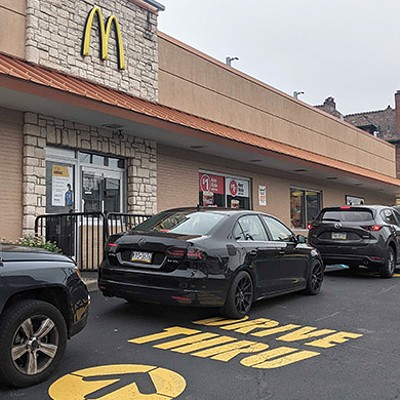Wednesday, July 9, 2014
Sustainable Pittsburgh’s Green Workplace Challenge
Sustainable Pittsburgh recently announced the top performers in its latest Pittsburgh Green Workplace Challenge. The results, while welcome, also suggest how far we have to go on sustainable use of resources.
The year-long competition asked businesses, nonprofits, municipal governments and universities to see which of them could improve most in energy and water usage, reduction of waste, and transportation. It also provides technical assistance on how to do so. More than 100 organizations took the 2013-14 challenge, which is meant to raise awareness as well as save resources.
Participants ranged from megacorps to small nonprofits.
Participants' initiatives included everything from installing more efficient boilers to switching to LED lights and having employees eat on china instead of disposable plates. In total, Challenge participants saved millions of dollars on their energy bills, and millions of gallons of water.
As for overall winners, in the various business categories, first-place honors went to FedEx Ground (Large Business), DMI Companies (Medium) and Pashek Associates (Small). (DMI is an HVAC ductwork outfit; Pashek does landscape architecture.)
The municipal/local-government winner was Allegheny County, while the university winner was the University of Pittsburgh.
I the nonprofit categories, the winners were ALCOSAN (Medium) and Conservation Consultants Inc. (Small).
A complete list of honorees, including runners-up, is here:GWC_Finale_results062614.pdf.
What difference does it all make? According to Matt Mehalik, Sustainable Pittsburgh’s program manager, the participants “once again illustrate that each action to save resources contributes to a larger effort that makes a large impact. And our region moves along toward a more sustainable path with each and every effort.”
The Challenge is good consciousness-raising, to be sure: Organizations see that using fewer resources saves them money, even as they're lightening the load on the planet. "By focusing on being more efficient, [Allegheny County] can ... reduce the cost of how we do business while having a positive impact on the environment," said County Executive Rich Fitzgerald in a statement.
But the Challenge’s own numbers indicate the limits of the approach.
For instance, it’s great that Challenge participants used less water: By contrast, the 2030 District — a community-based effort to get Downtown building-owners to voluntarily cut resource usage in half by 2030 — recently found that water usage by its participants actually increased.
Workplace Challenge participants, meanwhile, collectively saved about 5.4 million gallons of water. The “biggest loser” was ALCOSAN, which cut its in-house water usage by 76 percent. (That's separate from the sewage it treats, of course.) Sustainable Pittsburgh calculates that 5.4 million gallons is “the amount used by 57 typical households in a year.”
However, that doesn’t seem like a lot, considering that Challenge participants included some of the region’s largest employers — not just Pitt and FedEx, but also BNY Mellon, Carnegie Mellon University and Highmark, to name a few.
To be fair, there’s a bigger problem: Those figures reflect a country where people use water pretty profligately. At 5.4 million gallons per 57 households, the average U.S. household gulps 8,000 gallons a month. (Our per-capita usage is more than twice the global average.) And remember that water isn’t just H2O — it’s also the massive amounts of energy required to process it for drinking, pump it to your house, and treat the sewage on the other end.
On direct energy usage, Green Workplace savings were more substantial. Through various efficiency and conservation strategies, Green Workplace competitors “saved enough energy to power 3,308 average U.S. homes for a year [...], translating to $3.02 million in cost savings.” One participant, Conservation Consultants Inc., reduced its energy usage by 22 percent. (This is especially impressive given that CCI’s mission is to save people energy, and that the nonprofit has long inhabited an already quite-green South Side building.)
The total Challenge savings equaled some 37.3 million kilowatt-hours of energy. And in terms of the greenhouse-gas emissions that drive climate change, boasts Sustainable Pittsburgh, “participants saved over 4,821 metric tons of carbon-dioxide equivalent, which translates to roughly 121 airline flights of 500 miles, about three-quarters of a day’s worth of all flights leaving Pittsburgh International Airport.”
Wait. One hundred-plus organizations, including some of the region’s largest, spent a whole year trying to cut energy costs … and they didn’t even offset a single full day of the climate damage done at a single, half-empty airport?
The trouble, of course, isn’t the good folks at Sustainable Pittsburgh, or their well-meaning Challenge. It’s that our society gives us little incentive to use less fuel and water. (Especially water, which remains relatively cheap.)
And while saving money is nice, the ultimate goal is saving the planet for future generations: That’s what “sustainability” means, after all.
Our culture tells us that it's individual, voluntary efforts that save the day, but global environmental crises are one area where that's certainly not true. One can applaud the efforts of Sustainable Pittsburgh and its Challenge participants but still realize that most likely, the best way to make us truly sustainable is with a carbon tax, or some other means of making fossil-fuel usage something everyone — not just companies in a contest — has to cut. And by a lot more than we're used to.
Tags: Green Workplace Challenge , Sustainable Pittsburgh , environment













